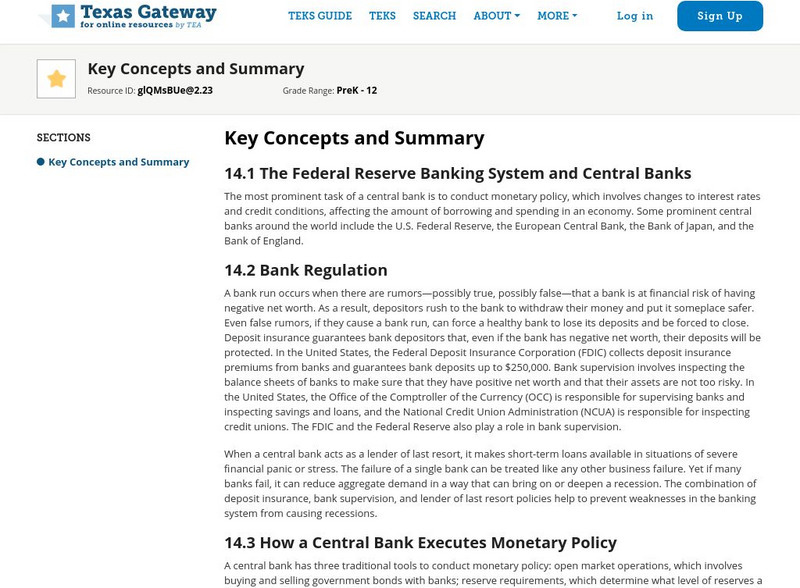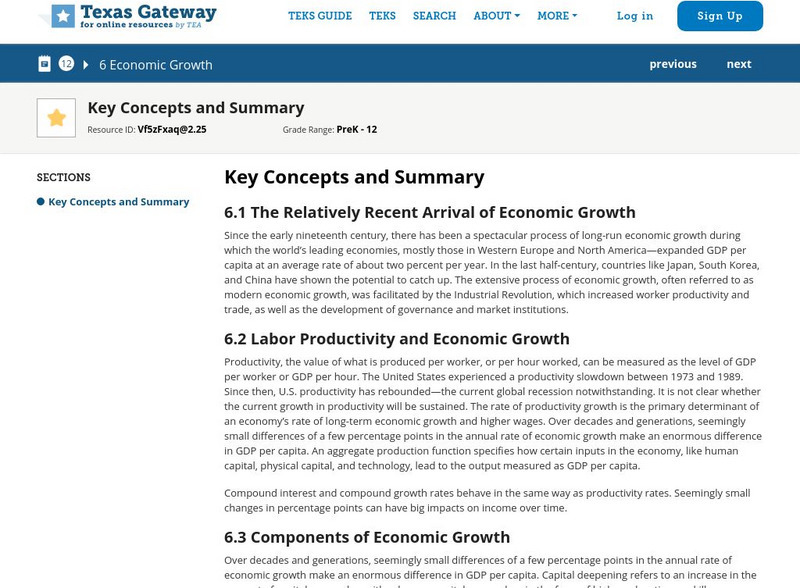Khan Academy
Khan Academy: Ap Macroeconomics: Lesson Summary: Opportunity Cost and the Ppc
In this lesson summary, review the key concepts, key terms, and key graphs for understanding opportunity cost and the production possibilities curve.
Texas Education Agency
Texas Gateway: Chapter 5: Macroeconomic Perspective: Key Concepts and Summary
This section provides a summary of each of the key concepts covered in Chapter 5: Macroeconomic Perspective.
Texas Education Agency
Texas Gateway: Chapter I: Welcome Economics!: Key Concepts and Summary
This section discusses and summarizes the key concepts of economics from Chapter I: Welcome Economics! from the TEA AP Macroeconomics online text.
Texas Education Agency
Texas Gateway: Ch. 15: Exchange Rates and Intl Capital Flows: Key Concepts
This section provides summaries for each of the key concepts covered in Chapter 15: Exchange Rates and International Capital Flows from the Texas Gateway AP Macroeconomics online textbook.
Texas Education Agency
Texas Gateway: Macroeconomics: Chapter 7: Unemployment: Key Concepts and Summary
This section provides a summary of the key concepts covered in Chapter 7: Unemployment.
Texas Education Agency
Texas Gateway: Chapter 4: Labor and Financial Markets: Key Concepts and Summary
This is a summary of the key concepts covered in Chapter 4: Labor and Financial Markets from the TEA AP Macroeconomics online text.
Texas Education Agency
Texas Gateway: Chapter 3: Demand and Supply: Key Concepts and Summary
This section summarizes the key concepts of Chapter 3: Demand and Supply from the TEA AP Macroeconomics online text.
Texas Education Agency
Texas Gateway: Chapter 12: Neoclassical Perspective: Key Concepts and Summary
This section summarizes the key concepts presented in Chapter 12: Neoclassical Perspective from the Texas Gateway AP Macroeconomics online text.
Texas Education Agency
Texas Gateway: Ch. 13: Money and Banking: Key Concepts and Summary
This section summarizes the key concepts presented in Ch. 13: Money and Banking from the Texas Gateway AP Macroeconomics online text.
Texas Education Agency
Texas Gateway: Ch. 17: Impacts of Government Borrowing: Key Concepts and Summary
This section summarizes the key concepts presented in Ch. 17: The Impacts of Government Borrowing from the Texas Gateway AP Macroeconomics online textbook.
Texas Education Agency
Texas Gateway: Ch. 16: Government Budgets: Key Concepts and Summary
This section provides a summary of the key concepts presented in Chapter 16: Government Budgets and Fiscal Policy from the Texas Gateway AP Macroeconomics online textbook.
Texas Education Agency
Texas Gateway: 14: Monetary Policy & Bank Regulation: Key Concepts and Summary
This section provides a summary of all of the key concepts in Chapter 14: Monetary Policy and Bank Regulation from the Texas Gateway AP Macroeconomics online textbook.
Texas Education Agency
Texas Gateway: Chapter 6: Economic Growth: Key Concepts and Summary
This section summarizes each of the key concepts discussed in Chapter 6: Economic Growth.
Texas Education Agency
Texas Gateway: Ch.9: Intl Trade and Capital Flows: Key Concepts and Summary
This section provides a summary of each of the key concepts covered in Chapter 9: International Trade and Capital Flows.
Texas Education Agency
Texas Gateway: Ch. 10: Aggregate Demand/supply Model: Key Concepts and Summary
This section summarizes each of the key concepts from Chapter 10: The Aggregate Demand/Aggregate Supply Model.
Texas Education Agency
Texas Gateway: Ap Macroeconomics: Appendices: Present Discounted Value
The concept of a present discounted value (PDV), which is defined as the amount you should be willing to pay in the present for a stream of expected future payments, can be used to calculate appropriate prices for stocks and bonds. To...
Tutor2u
Tutor2u: Macroeconomic Equilibrium
A definition of macroeconomic equilibrium and how it changes when either aggregate supply (AS) or aggregate demand (AD) shift. Many supporting graphs are provided to help explain this concept.
Texas Education Agency
Texas Gateway: Appendices: The Use of Mathematics in Principles of Economics
This appendix should be consulted after first reading "Welcome to Economics." Though economics is not math, there is no important concept in this course that cannot be explained without mathematics. That said, math is a tool that can be...
Khan Academy
Khan Academy: Market Equilibrium, Disequilibrium, and Changes in Equilibrium
In this lesson summary review and remind yourself of the key terms and graphs used in the analysis of markets. Topics include how to use a market model to predict how price and quantity change in a market when demand changes, supply...
Khan Academy
Khan Academy: Lesson Summary: Demand and the Determinants of Demand
In this lesson summary review and remind yourself of the key terms, graphs, and calculations used in analyzing the demand for the good. Review the distinction between demand and quantity demanded, the determinants of demand, and how to...
Khan Academy
Khan Academy: Lesson Summary: Business Cycles
In this lesson summary review and remind yourself of the key terms, concepts, and graphs related to the business cycle. Topics include the four phases of the business cycle and the relationship between key macroeconomic indicators at...
Khan Academy
Khan Academy: Lesson Summary: Financial Assets
This information is intended for AP Macroeconomics young scholars or for those taking college macroeconomics. This instructional activity summary reviews key terms and concepts related to financial assets. Topics include the basic types...
Khan Academy
Khan Academy: Lesson Summary: The Limitations of Gdp
In this lesson summary review and remind yourself of the key terms and concepts about the limitations of GDP. This resource is designed as a review for the AP Macroeconomics Test or a college-level macroeconomics course.
Khan Academy
Khan Academy: Lesson Summary: Supply and Its Determinants
For this lesson summary review and remind yourself of the key terms, graphs, and calculations used in the analysis of supply. Topics include the distinction between supply and quantity supplied, the law of supply, and the determinants of...























